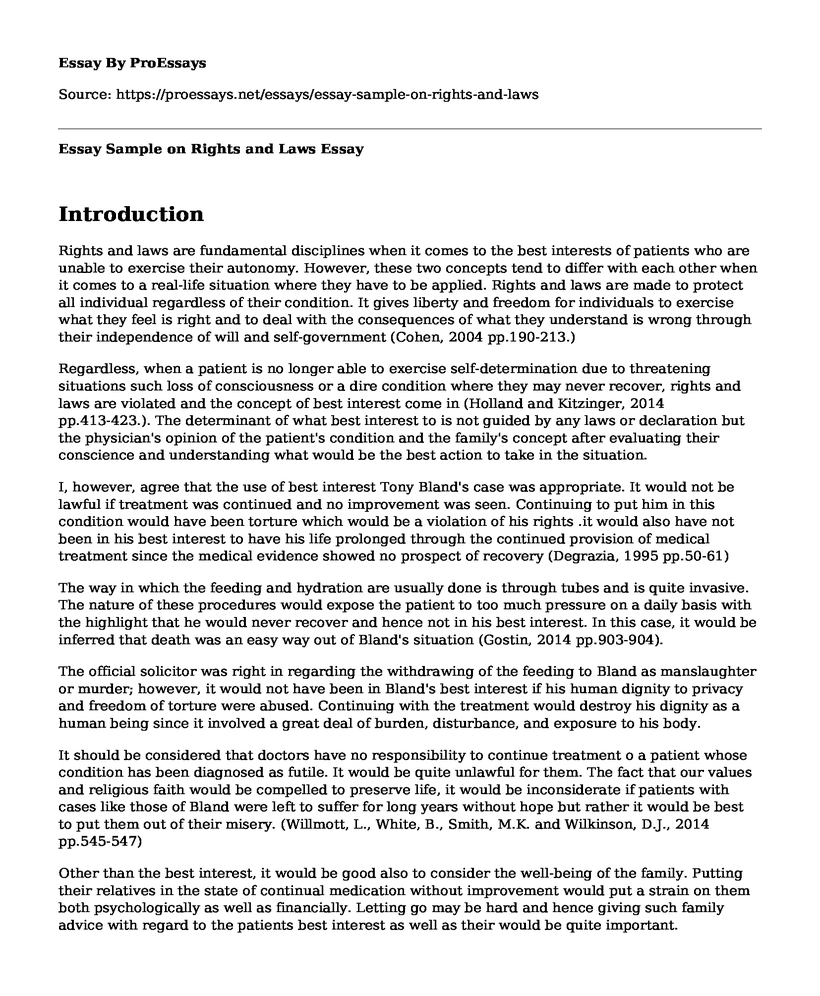Introduction
Rights and laws are fundamental disciplines when it comes to the best interests of patients who are unable to exercise their autonomy. However, these two concepts tend to differ with each other when it comes to a real-life situation where they have to be applied. Rights and laws are made to protect all individual regardless of their condition. It gives liberty and freedom for individuals to exercise what they feel is right and to deal with the consequences of what they understand is wrong through their independence of will and self-government (Cohen, 2004 pp.190-213.)
Regardless, when a patient is no longer able to exercise self-determination due to threatening situations such loss of consciousness or a dire condition where they may never recover, rights and laws are violated and the concept of best interest come in (Holland and Kitzinger, 2014 pp.413-423.). The determinant of what best interest to is not guided by any laws or declaration but the physician's opinion of the patient's condition and the family's concept after evaluating their conscience and understanding what would be the best action to take in the situation.
I, however, agree that the use of best interest Tony Bland's case was appropriate. It would not be lawful if treatment was continued and no improvement was seen. Continuing to put him in this condition would have been torture which would be a violation of his rights .it would also have not been in his best interest to have his life prolonged through the continued provision of medical treatment since the medical evidence showed no prospect of recovery (Degrazia, 1995 pp.50-61)
The way in which the feeding and hydration are usually done is through tubes and is quite invasive. The nature of these procedures would expose the patient to too much pressure on a daily basis with the highlight that he would never recover and hence not in his best interest. In this case, it would be inferred that death was an easy way out of Bland's situation (Gostin, 2014 pp.903-904).
The official solicitor was right in regarding the withdrawing of the feeding to Bland as manslaughter or murder; however, it would not have been in Bland's best interest if his human dignity to privacy and freedom of torture were abused. Continuing with the treatment would destroy his dignity as a human being since it involved a great deal of burden, disturbance, and exposure to his body.
It should be considered that doctors have no responsibility to continue treatment o a patient whose condition has been diagnosed as futile. It would be quite unlawful for them. The fact that our values and religious faith would be compelled to preserve life, it would be inconsiderate if patients with cases like those of Bland were left to suffer for long years without hope but rather it would be best to put them out of their misery. (Willmott, L., White, B., Smith, M.K. and Wilkinson, D.J., 2014 pp.545-547)
Other than the best interest, it would be good also to consider the well-being of the family. Putting their relatives in the state of continual medication without improvement would put a strain on them both psychologically as well as financially. Letting go may be hard and hence giving such family advice with regard to the patients best interest as well as their would be quite important.
References
Cohen, J., 2004. Minimalism about human rights: The most we can hope for? Journal of political philosophy, 12(2), pp.190-213.
Holland, S., Kitzinger, C. and Kitzinger, J., 2014. Death, treatment decisions and the permanent vegetative state: evidence from families and experts. Medicine, Health Care and Philosophy, 17(3), pp.413-423.
Degrazia, D., 1995. Value theory and the best interest are standard. Bioethics, 9(1), pp.50-61.
Gostin, L.O., 2014. Legal and ethical responsibilities following brain death: the McMath and Munoz cases. Jama, 311(9), pp.903-904.
Willmott, L., White, B., Smith, M.K. and Wilkinson, D.J., 2014. Withholding and withdrawing life-sustaining treatment in a patient's best interests: Australian judicial deliberations. Medical Journal of Australia, 201(9), pp.545-547.
Cite this page
Essay Sample on Rights and Laws. (2022, Mar 31). Retrieved from https://proessays.net/essays/essay-sample-on-rights-and-laws
If you are the original author of this essay and no longer wish to have it published on the ProEssays website, please click below to request its removal:
- Judicial Reforms in China: A Lesson for Cambodia
- Link Between Violence and Mental Disorder Essay
- Essay Sample on Presumption of Innocence
- Essay on US Healthcare Reform: Senate-House Passes Act for Lower Prescription Drug Cost
- Richard Ramirez Crimes Case Study Paper Example
- Essay on Walter Jordan: Negligence of Arizona Department of Correction Led to Skin Cancer Death
- Examination of Mental Health Reforms from Criminal Justice Perspective - Paper Example







